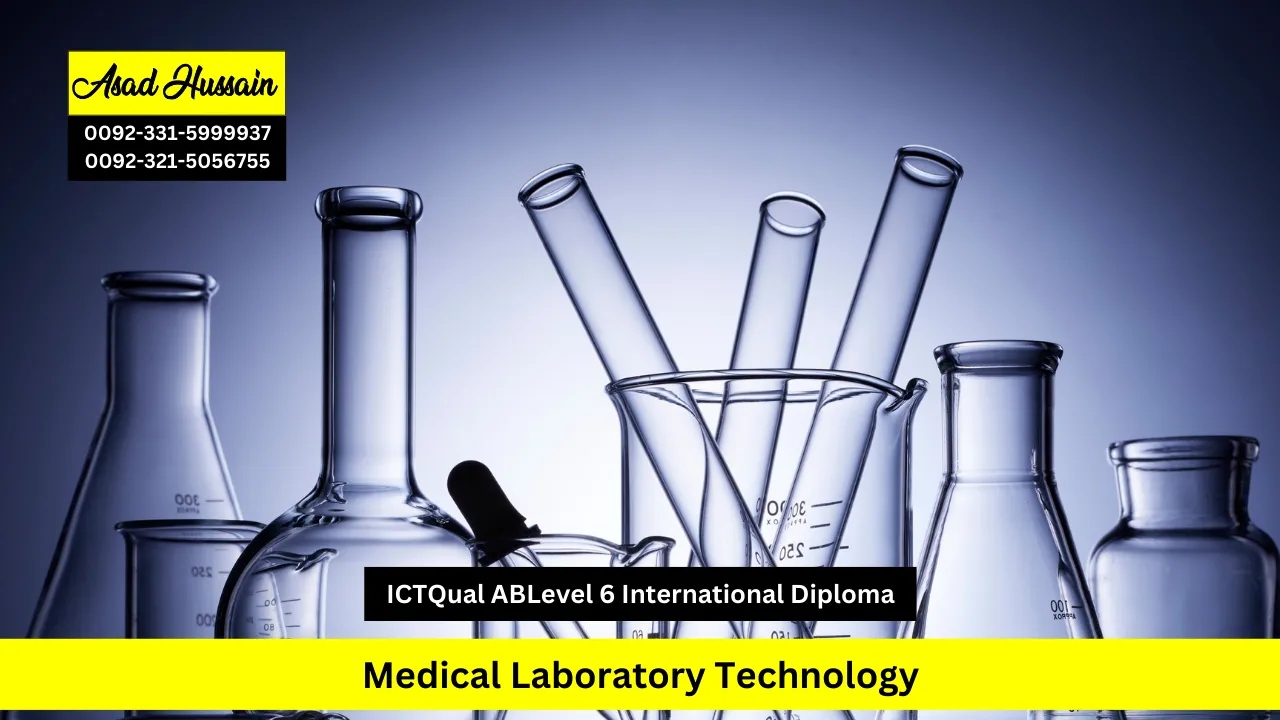Medical laboratory technology is a cornerstone of modern healthcare, playing a crucial role in the accurate diagnosis, monitoring, and treatment of diseases. High-quality laboratory testing informs clinical decision-making, supports public health initiatives, and drives biomedical research, making skilled laboratory professionals indispensable to healthcare systems worldwide. The ICTQual AB Level 6 International Diploma in Medical Laboratory Technology is designed to equip learners with advanced theoretical knowledge, practical skills, and professional competencies essential for effective performance in clinical laboratory operations, diagnostic analysis, and scientific research.
ICTQual AB Level 6 International Diploma in Medical Laboratory Technology provides comprehensive coverage of critical areas, including laboratory techniques, clinical biochemistry, microbiology, hematology, molecular diagnostics, and quality assurance protocols. Learners gain extensive hands-on experience in sample collection, laboratory analysis, adherence to safety standards, and the use of sophisticated diagnostic instruments. By combining rigorous theoretical instruction with practical laboratory application, the program ensures that graduates can confidently perform essential laboratory procedures and contribute meaningfully to patient care and scientific investigations.
Graduates will be well-prepared to pursue careers in hospitals, diagnostic laboratories, research institutions, and public health organizations. They will develop essential skills in laboratory management, data interpretation, quality control, and research methodology, enabling them to make evidence-based decisions and drive innovation in healthcare and biomedical science. This diploma also provides a robust foundation for further specialization, advanced professional training, or postgraduate studies, while significantly enhancing employability in the global healthcare and scientific community.
By completing this program, learners will emerge as competent, confident, and globally recognized medical laboratory professionals, ready to make a meaningful impact in healthcare delivery, research innovation, and the advancement of medical science worldwide.
Program Highlights
Study Units
Year 1: Foundation in Medical Laboratory Technology
- Fundamentals of Medical Laboratory Science
- Human Anatomy and Physiology
- General Biochemistry
- Principles of Microbiology
- Immunology and Serology
- Introduction to Pathology
- Basic Haematology
- Laboratory Safety and Quality Assurance
- Computer Applications in Laboratory Practice
- Communication Skills for Healthcare Professionals
- Medical Ethics and Professional Conduct
- Research Methods in Health Sciences
Year 2: Intermediate Laboratory Applications
- Clinical Biochemistry Techniques
- Advanced Microbiology
- Diagnostic Parasitology
- Molecular Biology Basics
- Blood Banking and Transfusion Science
- Clinical Haematology
- Histopathology Techniques
- Cytology and Cytogenetics
- Instrumentation and Analytical Methods
- Epidemiology and Public Health
- Environmental and Food Microbiology
- Clinical Laboratory Management
Year 3: Advanced Laboratory Specialisation
- Advanced Molecular Diagnostics
- Clinical Immunology
- Advanced Histopathology
- Clinical Virology
- Toxicology and Forensic Science
- Advanced Parasitology
- Automation in Medical Laboratories
- Advanced Transfusion Medicine
- Laboratory Data Analysis and Interpretation
- Emerging Diseases and Diagnostic Innovations
- Research Project / Dissertation
- Professional Practice and Internship
To ensure learners are fully prepared for the rigorous academic and practical demands of advanced study in medical laboratory technology, applicants must meet specific entry criteria. These requirements are designed to verify that candidates possess the foundational knowledge, practical skills, and professional readiness necessary to succeed in this internationally recognized diploma program.
Age Requirements
- Learners must be at least 18 years of age at the time of enrollment.
- Applicants should demonstrate maturity and readiness for advanced-level study.
Educational Requirements
- A Level 5 Diploma or equivalent qualification in Medical Laboratory Technology, Biomedical Science, or a related healthcare/science field.
- Candidates with strong backgrounds in biology, chemistry, or health sciences may also be considered.
Professional Experience
- Prior experience in clinical laboratories, healthcare, or research settings is advantageous but not mandatory.
- Candidates with professional exposure to laboratory operations or diagnostic techniques will have a practical edge.
English Language Proficiency
- Learners must demonstrate proficiency in English to engage effectively with course materials.
- This can be shown through recognized English qualifications or prior education in English-medium institutions.
Applicants not fully meeting these criteria may be considered based on prior learning or professional experience. A related course to complement this diploma is the ICTQual AB Level 6 International Diploma in Nursing & Midwifery, which emphasizes clinical patient care alongside diagnostic understanding.
The ICTQual AB Level 6 International Diploma in Medical Laboratory Technology is designed to equip learners with advanced knowledge, technical skills, and professional competencies required for high-level roles in clinical laboratories, research institutions, and healthcare settings. Upon completing this programme, learners will be able to apply scientific principles, laboratory techniques, and analytical methods to real-world medical and diagnostic scenarios.
Year 1: Foundation in Medical Laboratory Technology – Learning Outcomes
- Fundamentals of Medical Laboratory Science
- Understand the scope, principles, and workflow of medical laboratory science.
- Apply basic laboratory techniques and standard operating procedures effectively.
- Develop critical thinking and problem-solving skills in laboratory settings.
- Human Anatomy and Physiology
- Demonstrate knowledge of human body systems and their interrelations.
- Apply anatomical and physiological principles to clinical laboratory practice.
- Relate structural and functional aspects to disease processes.
- General Biochemistry
- Perform fundamental biochemical assays and interpret results accurately.
- Understand molecular processes and their relevance to human health.
- Apply biochemical knowledge to diagnostic procedures.
- Principles of Microbiology
- Identify and classify microorganisms using standard laboratory techniques.
- Understand microbial growth, physiology, and pathogenicity.
- Apply aseptic techniques and laboratory safety measures.
- Immunology and Serology
- Explain basic immunological principles and immune system function.
- Conduct fundamental serological tests and interpret findings.
- Apply immunology knowledge to clinical diagnostic applications.
- Introduction to Pathology
- Understand common pathological processes and disease mechanisms.
- Relate pathology concepts to laboratory diagnostics.
- Recognize laboratory markers of disease and tissue abnormalities.
- Basic Haematology
- Perform routine blood tests and interpret haematological data.
- Understand the components and functions of blood in health and disease.
- Apply haematology techniques safely and accurately.
- Laboratory Safety and Quality Assurance
- Implement laboratory safety protocols and risk management strategies.
- Apply quality assurance standards to laboratory procedures.
- Maintain compliance with regulatory and ethical standards.
- Computer Applications in Laboratory Practice
- Use laboratory software for data entry, management, and analysis.
- Generate reports and document laboratory findings effectively.
- Apply digital tools to improve laboratory efficiency.
- Communication Skills for Healthcare Professionals
- Demonstrate clear, professional communication in healthcare settings.
- Prepare reports and present laboratory results effectively.
- Collaborate efficiently within multidisciplinary teams.
- Medical Ethics and Professional Conduct
- Apply ethical principles and professional standards in laboratory practice.
- Recognize patient confidentiality and professional responsibilities.
- Develop a foundation for responsible decision-making.
- Research Methods in Health Sciences
- Understand research methodology and experimental design in laboratory sciences.
- Collect, analyse, and interpret scientific data.
- Apply evidence-based practices in laboratory investigations.
Year 2: Intermediate Laboratory Applications – Learning Outcomes
- Clinical Biochemistry Techniques
- Perform clinical biochemical assays with accuracy and precision.
- Interpret laboratory results in a clinical context to support patient diagnosis.
- Apply standard operating procedures for laboratory safety and efficiency.
- Advanced Microbiology
- Identify and characterize pathogenic microorganisms using advanced techniques.
- Apply microbiological principles to clinical, environmental, and research settings.
- Conduct antimicrobial susceptibility testing and interpret findings effectively.
- Diagnostic Parasitology
- Detect and identify parasitic organisms relevant to human health.
- Apply laboratory techniques for sample collection, preparation, and analysis.
- Interpret parasitological data to support diagnostic and treatment decisions.
- Molecular Biology Basics
- Understand the principles of DNA, RNA, and protein analysis in diagnostics.
- Perform basic molecular biology techniques, such as PCR and gel electrophoresis.
- Apply molecular data to complement clinical laboratory investigations.
- Blood Banking and Transfusion Science
- Conduct blood grouping, cross-matching, and compatibility testing.
- Understand transfusion protocols and safety standards.
- Manage blood storage, inventory, and quality control procedures.
- Clinical Haematology
- Perform intermediate haematological tests and interpret results.
- Understand haematological disorders and laboratory indicators.
- Apply laboratory techniques to support clinical decision-making.
- Histopathology Techniques
- Prepare, stain, and examine tissue samples for diagnostic purposes.
- Identify pathological changes and tissue abnormalities.
- Apply quality control and laboratory safety in histopathology procedures.
- Cytology and Cytogenetics
- Prepare and analyse cytological samples for disease detection.
- Understand chromosomal structures and genetic abnormalities.
- Apply cytogenetic techniques to support diagnostic and research applications.
- Instrumentation and Analytical Methods
- Operate laboratory instruments accurately and safely.
- Apply quantitative and qualitative analytical methods in diagnostics.
- Troubleshoot common laboratory instrumentation issues.
- Epidemiology and Public Health
- Analyse epidemiological data to identify health trends and outbreaks.
- Apply principles of public health and preventive measures in laboratory practice.
- Evaluate laboratory data to inform public health decisions.
- Environmental and Food Microbiology
- Detect and analyse microbial contamination in food and environmental samples.
- Apply laboratory techniques to assess safety and hygiene standards.
- Interpret results to support public health and regulatory compliance.
- Clinical Laboratory Management
- Implement quality assurance, workflow optimization, and resource management.
- Understand regulatory standards and compliance requirements.
- Lead laboratory teams and manage day-to-day operations effectively.
Year 3: Advanced Laboratory Specialisation – Learning Outcomes
- Advanced Molecular Diagnostics
- Apply advanced molecular biology techniques such as PCR, sequencing, and genotyping.
- Interpret molecular diagnostic data for clinical and research purposes.
- Integrate molecular approaches into routine laboratory workflows.
- Clinical Immunology
- Perform and interpret complex immunological assays and tests.
- Analyse immune system responses in health and disease.
- Apply immunology principles in diagnostics, therapy, and research.
- Advanced Histopathology
- Prepare and analyse complex tissue samples for disease diagnosis.
- Identify subtle pathological changes and markers.
- Apply advanced staining and imaging techniques with precision.
- Clinical Virology
- Detect, identify, and analyse viral pathogens using modern techniques.
- Interpret virological data for patient diagnosis and epidemiology.
- Apply safety protocols in handling infectious viral samples.
- Toxicology and Forensic Science
- Conduct toxicological analyses on biological and environmental samples.
- Apply forensic laboratory techniques to investigate chemical and biological hazards.
- Interpret data to support clinical, legal, and research outcomes.
- Advanced Parasitology
- Identify and analyse parasitic organisms using sophisticated laboratory methods.
- Integrate parasitological findings into clinical and epidemiological contexts.
- Apply quality control and safety standards in parasitology practice.
- Automation in Medical Laboratories
- Operate and troubleshoot automated laboratory instruments.
- Implement workflow automation for efficiency and accuracy.
- Integrate automation into diagnostic and research procedures.
- Advanced Transfusion Medicine
- Perform complex blood typing, compatibility testing, and transfusion protocols.
- Manage advanced transfusion techniques in clinical settings.
- Ensure safety, compliance, and quality in blood product handling.
- Laboratory Data Analysis and Interpretation
- Analyse complex datasets from multiple laboratory disciplines.
- Apply statistical tools and software for accurate interpretation.
- Use data to support clinical decisions, research, and publications.
- Emerging Diseases and Diagnostic Innovations
- Understand novel pathogens and cutting-edge diagnostic technologies.
- Evaluate innovations for clinical and public health applications.
- Apply emerging techniques to enhance laboratory practice.
- Research Project / Dissertation
- Conduct independent, evidence-based research in medical laboratory science.
- Demonstrate project planning, methodology, data collection, and analysis skills.
- Present findings effectively, showcasing advanced scientific and professional competence.
The ICTQual AB Level 6 International Diploma in Medical Laboratory Technology is tailored for individuals seeking to advance their careers in healthcare, diagnostics, and biomedical research. The course is suitable for learners from diverse professional and academic backgrounds who are motivated to develop advanced laboratory skills and knowledge.
Educational Instructors and Trainers
- Professionals teaching healthcare, biomedical, or laboratory sciences can enhance their instructional methods with up-to-date laboratory practices.
- Gain advanced technical knowledge to integrate into curricula, improving learning outcomes for students.
Environmental Advocates and Activists
- Professionals focused on public health and environmental monitoring can apply laboratory techniques to assess environmental impacts on health.
- Develop skills to conduct scientifically rigorous analyses supporting sustainability and public health initiatives.
Students and Recent Graduates
- Graduates of healthcare, biomedical, or science programs can gain practical laboratory experience and industry-recognized credentials.
- Build competencies in clinical diagnostics, laboratory management, and research methodology for career entry or progression.
Career Changers
- Individuals transitioning from other fields into healthcare or laboratory science can acquire essential technical and theoretical skills.
- Gain globally recognized qualifications that open new opportunities in hospitals, research labs, and diagnostic centers.
Policy Makers and Regulators
- Professionals involved in healthcare policy, laboratory standards, or public health regulations can enhance their understanding of laboratory practices.
- Apply knowledge to develop informed policies, implement quality standards, and improve regulatory compliance.
By completing this program, learners will emerge as competent, confident, and internationally recognized laboratory professionals capable of contributing effectively to healthcare, research, and public health innovation.







